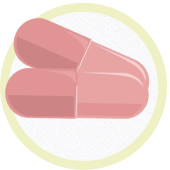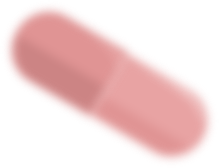


Needful Bacteria
In order to feel well, we need to take care of our bodies. More than 25 years ago, we created Lactoflor: the first Bulgarian probiotic product based on the lactic acid bacteria, Lactobacillus bulgaricus. Discovered by scientists in 1905, the bacterium bulgaricus (prevalent in Bulgaria) is considered a natural source of health and longevity, actuated by Bulgarian nature.
The mission of Lactoflor is to restore the balance of the gastrointestinal tract, enhance immunity, regulate metabolism, and, most of all, awaken our inner strength. Good health starts within. Enjoy life, rich in a diverse diet and activity. We all have the right to live our lives the way we want. Lactoflor. healthy life.
Go to ProductsWhat are Probiotics?

In Two Words: Good Bacteria.
The root of the word probiotic originates from the Greek words pro (for) and bios (life), or ‘for life’. According to the Food and Agriculture Organization of the United Nations (FAO, 2001), probiotics are ‘live microorganisms which, when administered in adequate amounts, confer health benefits on the [human] host’.
A Few More Details
Probiotics are live microscopic organisms which help balance gastrointestinal microbiota. Simply put, they are the supplement necessary to ensure victory of good bacteria over bad bacteria. When good bacteria rule over bad bacteria, we are able to clense ourselves from toxins, boost our immune system, and even have fresh, beautiful, radient skin.
Up to 70% of the world’s population today needs improvement of the microbiota in their intestinal tracts.

Why Take Probiotics?
Our digestive system hosts over 500 different types of bacteria,
which are part of the normal gastrointestinal microbiota. They
belong to three main groups of microorganisms:
1. Pathogenes—which cause harm.
2. Conditional pathogens—which under normal conditions are not able to cause a disease but become
pathogenic when immune protection is impaired.
3. Beneficial—which have beneficial effects on the body.
The ratio of these groups of microorganisms conditions the normal
functioning of the gastrointestinal tract and immune system and,
consequently, human health.
In addition to being abundant,
intestinal flora is extremely susceptive to external stimuli.
Worsening environmental conditions and changes in the resilience
of our bodies virtually kill good bacteria in the body, due
stress, inappropriate diet, intake of antibiotics and
immunosuppressants, sleep deficiency, and bacterial infections.
Let’s face it probiotics cannot fully replace intestinal flora.
But they can facilitate the development of good bacteria, which
maintain the balance of intestinal flora. And they can help people
to feel healther, more beautiful, and happier.


Lactoflor offers the first range of probiotics which contain natural, beneficial bacteria isolated from Bulgarian nature in combination with prebiotics, intended for easier absorption into the total intestinal flora.
Probiotic? Prebiotic? Synbiotic!















Bulgarian Yoghurt
Bulgarian yoghurt is the oldest probiotic known to humankind. Since ancient times, yoghurt has been used as food to strengthen health and contribute to longevity. Its nutritional value and health properties have been shrouded in myth and legend.
This ancient, renowned probiotic forms the basis of the entire product range of probiotics with the trademark Lactoflor. Lactoflor’s secret lies in the symbiosis between Lactobacullus bulgaricus and Streptococcus thermophilus, which is the only synergy that, during fermentation, results in obtaining the valued properties of Bulgarian yoghurt.

Probiotics
Probiotics are good bacteria which help restore the balance of gastrointestinal microbiota and consequently improve our immune system and health.

Prebiotics
(contained in Lactoflor is inulin.)
Prebiotics are the food of good bacteria and include fibers which help develop the beneficial effect of probiotics and their survival in the human intestinal tract. In Lactoflor, we use inulin—a bio prebiotic extracted from chicory roots. It is proven that inulin can increase good bacteria over tenfold.

Synbiotics
Lactoflor is a synbiotic. Synbiotics are a combination of probiotics (good bacteria) and prebiotics (the food in order for probiotics to work), which we combine into one chewable tablet, capsule, or sachet
How Do They Work?
In Lactoflor, we believe that happiness is hidden where it is least expected—in the millions of
good
bacteria living in the gastrointestinal tract, which contribute to a stronger immune protection, more
beautiful skin, and even body weight regulation.
Here is how good bacteria work:

Restore
Balance
Probiotics restore the balance of gastrointestinal microbiota and help boost our immune system and health. This is especially true after the intake of antibiotics, which literally destroy the population of good bacteria in the body.
Stimulate
Immunity
helps strengthen our immune system. In other words- Probiotics contribute to improving our health.
Help
Regulate Body Weight
When balanced, our microbiota works considerably better. Taking probiotics aids in protecting against digestion disorders and intestinal discomfort.
Detox
the Body
The intake of probiotics results in quicker elimination of harmful substances from the body and, therefore, helps reduce toxins that the body is struggling to remove, in case they stay longer in the digestive system.
Products
Lactoflor offers a full range of combined synbiotic products (prebiotics and probiotics) that contain selected strains of lactic acid bacteria, including Lactobacillus delbrueckii ssp. bulgaricus (Lactobacillus bulgaricus) and Streptococcus thermophilus, Lactobacillus acidophilus and Bifidobacterium ssp. Lactoflor is available in chewable tablets, capsules, or soluble sachets for children.








Lactoflor Kids
Specifically for Babies and Children - for Healthy Bellies and Strong Immunity
Lactoflor Kids contains seven strains of lactic acid bacteria, as well as fibers, developed especially for babies and young children—strains which help boost children’s immune protection and digestive system.
Lactoflor Kids alleviates symptoms of lactose intolerance and helps prevent and stop diarrhea symptoms.
Contains: 10 sachets per package
Read more
Lactoflor BioPlus
TABLETS
Oral Immune Protection Formula
Lactoflor BioPlus Tablets are synbiotic chewable tablets which contain unique Bulgarian strains (L. bulgaricus LKZ-200, L. rhamnosus LLR-L1 (with high bioavailability and enhanced activity against Candida, E.Coli, and St.Aureus) and Streptococcus thermophilus), as well as isomalt and prebiotics (inulin- fibre).
Lactoflor BioPlus Tablets reduce gum inflammation, prevent formation of dental plaque in the oral cavity, counteract bad bacteria, and facilitate intestinal comfort.
Contains: 20 tablets
Read more
Lactoflor BioPlus
CAPSULES
Daily Care for Gastrointestinal Comfort
Lactoflor BioPlus Capsules is a synbiotic product which contains 7
strains of lactic acid
bacteria (with high bioavailability) and prebiotic (inulin). In addition to Lactobacillus
acidophilus, Streptococcus thermophilus, and Bifidobacterium sp. (B.bifidum; B.longum;
B.infantis).
Lactoflor BioPlus Capsules are also enriched with two unique
Bulgarian strains:
Lactobacillus bulgaricus (isolated from Geranium sanguineum) and Lactobacillus rhamnosus.
Lactoflor BioPlus Capsules restore intestinal microbiota balance and are
suitable for
prevention, detoxication, and long-term intake.
Contains: 60 capsules
Read more
LACTOFLOR Opti6
Powerful Immune Boost Formula
Lactoflor Opti6 is a powerful probiotic immune boost formula, suitable during and after antibiotic treatment. Opti6 contains 6 strains of lactic acid bacteria (with high biological activity) and prebiotic (inulin), ensuring anti-microbial activity against various pathogens. These strains improve digestion and intestinal microbiota balance. The beneficial bacteria contained in Opti6 Opti6 are derived from environmentally clean, well-preserved, organic sources of Bulgarian nature.
Contains: 30 capsules
Read more
LACTOFLOR HELICO PROTECT
Aids against Helicobacter pylori
Lactoflor Helico Protect is a probiotic product containing a combination of Pylopass™ (a proprietary strain of clinically tested Lactobacillus reuteris ) and Zn-L-carnosine. The combined substances specifically co-aggregate with H.pylori (bad bacteria) and ensure their effective removal from the gastrointestinal tract.
Contains: 15 capsules
Read more
LACTOFLOR ENTERIC ECOL
Clinically Tested Solution against Diarrhoea
Lactoflor Enteric Ecol is a probiotic product containing Saccharomyces boulardii and lactic acid bacteria that stops diarrhoea in a natural way and restores functioning of intestinal microbiota, respectively.
Contains: 10 capsules/10 sachets
Read more
LACTOFLOR UROBiotic+
PROBIOTIC BLEND WITH URSOLIA®
FOR PREVENTION OF URINARY TRACT INFECTIONS.
Suitable for prophylaxis and prevention of recurrent urinary tract infections. A synergetic combination of well-researched herbal extracts (Ursolia® containing an extract of Salvia officinalis, and Exocyan® containing cranberry extract), D-mannose, and probiotic blend.
Contents: 30 capsules per bottle.
Read more
Lactoflor ProBiotic
For better health, more energy, and resistance against infection
Lactoflor ProBiotic contains only natural ingredients and includes 4 unique strains (Lactobacillus bulgaricus, Lactobacillus acidophilus, Streptococcus thermophilus, Bifidobacterium sp.)
Lactoflor ProBiotic supports the functioning of gastrointestinal microbiota affected by intestinal infections or antibiotic treatment and improves our immune system.
Contains: 90 capsules per bottle
Read more

A new-generation synbiotic containing 7 types of lactic acid bacteria with a high biological value and prebiotic , which improves digestive processes. Beneficial bacteria contained in Lactoflor Opti6 are isolated from environmentally clean, well-preserved organic sources of Bulgarian nature.
Read morePhysicians Appraisals
Dr Yordan Popov
Dr Dimitar* Angelov
Zdrave
Integrated Hospital for Active Treatment OOD, Pulmed Hospital, Plovdiv, Bulgaria.
Probiotics are widely and successfully used to treat and prevent most diseases,
especially those of the gastrointestinal tract, including diarrhoea and constipation of various
aetiology, implications resulting from antibiotic treatment, food poisoning, acute intestinal
infections, chronic colitis and enterocolitis, weakened immunity, bad breath, chemotherapy and
radiation therapy implications, as well as other conditions. To this end, probiotics should comply
with these requirements:
• High viability.
• Biological activity.
• Resistance to stomach pH.
• Belong to normal GIT inhabitants.
• Be resistant to antibiotics.
• Ability to suppress the growth of pathogenic bacteria and/or viruses.
• Restore and maintain the balance of gastrointestinal microbiota.
As products containing live microorganisms, probiotics also require specific conditions for storage and use. In order to be effective, probiotics should be taken separately from medication and food, at least 20-30 minutes before or after meals with a sufficient amount of water. ( See American Journal of Internal Medicine, NY, 2011.)
Probiotics and probiotic-based products have now taken their well-deserved place in health care, both as adjunctive therapy with antibiotic treatment and as agents used in treating a number of conditions, including IBS, IBD, polychemotherapy implications, antibiotic-associated diarrhoea syndrome, necrotizing enterocolitis, and travelers’ diarrhoea. These products are also used in the reconvalescent period after infectious and viral gastroenterocolitis. In addition, according to most recent publications, probiotic products aid in eradicating H. pylori (based on the biological principle of competition). .
Probiotics help digestion and aid in eliminating and excreting waste from the body and function in the synthesis of vitamins, as well as the inhibition of pathogenic microorganisms and conditional pathogens. Probiotics also facilitate the elimination of toxins. In general, the small intestine and colon host hundreds of types of bacteria which play an active role in building our self-image and health. Gastrointestinal microbiota is constantly subjected to environmental impact and coordinates the function of the immune and digestive systems. Gastrointestinal microbiota maintains the balance and internal environment in the intestines and suppresses the growth of pathogenic microorganisms and conditional pathogens. When the functioning of the GIT is impaired, the growth of pathogens and conditional pathogens is commonly observed, which leads to motility disorders and dysfunction in the processes of resorption and elimination in the GIT. This is where probiotics come into play—restoring biological equilibrium, as well as the balance of gastrointestinal microbiota. (See UK J of Gastroenterology, L., 2011, ch.4, p.256.)
Probiotics contain various microbiological strains of microorganisms that normally exist in our GIT, including the most common and popular ones: Lactobacillus acidophilus, Bifidobacterium bifidum, Lactobacillus casei, Bifidobacterium longum, Lactobacillus rhamnosus, Bifidobacterium infantis, Streptococcus thermophillus, and Lactobacillus bulgaricus. If used properly and regularly and stored appropriately, probiotics are very efficacious in treating and preventing a number of diseases, mostly gastrointestinal tract disorders. (Journal of Clinical Bacteriology, NY, 2010).
In this context, we would like to share our clinical experience in the administration of probiotics. According to WHO (World Health Organization), irritable bowel syndrome (IBS) accounts for some 40% of the cases in gastroenterologists’ routine practice. (Ann J of Gastroenterology, WHO, Geneva, 2012) Administering probiotics in IBS patients has become an established standard in day-to-day medical practice. According to WHO (Ann J of Bact Deseases, WHO, Geneva, 2012), antibiotic-associated dysbacteriosis and diarrhea syndrome account for 25-28% of functional gastrointestinal disorders.
From 01 June to 01 October 2013, 87 patients with IBS were referred to our clinic. Single probiotic therapy was recommended to 70 patients. During follow-up visits, a clinical effect was reported in 60 patients, such results as improved self-image, discontinued bloating, lack of gas and flatulation, regular physiological rhythm in bowel movements. Double therapy was recommended to 17 patients—6 patients received probiotics and concentrated and standardised extracts (via gelatine capsules), and 11 patients received Simethiconе. A clinical effect (in the above indicators) was observed in 14 patients.
The data presented above support the routine administration of probiotics as a monotherapy and their administration in combination with other drugs influencing gastrointestinal motility and adsorption and evacuation of gas that is produced in larger amounts in specific functional and fermentation-associated GI disorders.
From 01 August to 01 October 2013, 23 patients with antibiotic-associated
dysbacteriosis and diarrhoea syndrome were referred to our clinic. It was concluded that 12 of
these patients had classic antibiotic-associated diarrhoea syndrome, resulting from antibiotic
treatment for pulmonary pathology and upper respiratory tract pathology. These patients were
treated with a probiotic monotherapy. An effect (in the above indicators) was reported in all 12
patients. The remaining 11 patients received combination therapy, including a probiotic product and
Otilonium bromide. A clinical effect (in the above indicators) was observed in 10 of these
patients. The above data convincingly demonstrate the effect of administering probiotic agents in
routine clinical practice.
In patients who were prescribed probiotic products manufactured by Kendy Pharma*
*Да се поправи в БГ текста- Kendy, а не Kandy- има го на 4 места до края на този текст
(Lactoflor Probiotic and Lactoflor BioPlus capsules), the following effects were reported:
1. In the group of 87 patients with IBS, probiotics (manufactured by Kendy Pharma) were prescribed
to 56 patients. An effect was reported in all 56 patients. (Effect means that a response was
observed in at least two of the aforementioned indicators.)
2. In the group of 23 patients with antibiotic-associated dysbacteriosis and diarrhoea syndrome,
probiotics (manufactured by Kendy Pharma) were prescribed to 20 patients. An effect was reported in
17 patients.
CONCLUSIONS:
The above data convincingly demonstrate the effectiveness of probiotic products manufactured by
Kendy Pharma in cases of:
1. IBS.
2. Dysbacteriosis.
3. Post-antibiotic diarrhoea.
4. Probiotics manufactured by Kendy Pharma are reliable products. There have been no reports of any
adverse effects that could be associated with the intake of this type of probiotics.
Dr Vasil Rankov
Tsar Boris III National Integrated
Transport Hospital, Sofia, Bulgaria.
Lactoflor BioPlus is a proprietary probiotic combination containing only natural ingredients, including two unique strains: Lactobacilus bulgaricus and Streptococcus thermophilus. The fibers (inulin) added to the combination of Lactoflor BioPlus cleanse the body and support digestive processes, as well as the activity of beneficial bacteria.
Lactoflor BioPlus is particularly appropriate in a number of gastroenterological and hepatological pathologies observed in patients referred to our clinic. Lactoflor BioPlus is also applicable in patients after chemotherapy, radiation therapy and post-operative recovery.
The most common health cases include:
• Inflammatory disease of the lower gastrointestinal tract, with various pathophysiologies, such as
IBD, Crohn's disease, ulcerative colitis, and irritable bowel syndrome.
• Bacterial diarrhoea.
• Adjunctive therapy for Helicobacter pylori eradication.
• Dysbacteriosis.
• Lactase deficiency.
Lactoflor BioPlus should be taken 1 to 3 months, depending on the patient’s condition and disorder.
The combination of lactic acid bacteria and fibers improves and conditions the functioning of the stomach, small intestines, and colon. It also improves peristalsis and leads to normalising the functional condition of the gastrointestinal tract.
Lactoflor BioPlus can be administered (at physician’s discretion) in post-operative periods for quicker recovery of the functioning of the small intestines and colon, which results in more rapid recovery and reduces post-operative complications.
Efficiency of Lactoflor BioPlus
Nutritional value:
• Increases the body’s absorption of proteins, fats, and P, Ca, Fe.
• Enhances stability of vitamins В1, В2, В12.
• Stimulates release of digestive juices.
• Stimulates growth.
Health benefits:
• Regulates the function of the gastrointestinal tract.
• Strengthens the body’s resistance against contagious diseases.
• Mitigates milk sugar intolerance.
• Reduces amount of cholesterol and ammonia in the blood.
• Suppresses development of harmful organisms in the gastrointestinal tract.
• Anti-tumour effect.
• Increases life expectancy.
Dr K. Petrov
Clinic for Metabolic and Endocrine Diseases
and Dietology, Tsaritsa Yoanna ISUL University Hospital, Medical University, Sofia,
Bulgaria.
The main properties of live organisms include feeding, breathing, movement, and reproduction, strongly influenced by technology and industrialisation. Those that are most affected include such high-risk groups as premature babies, infants, and children. Feeding and nutrition are among the first and most important interactions of the body with its environment.
The Joint FAO/WHO Expert Consultation on Evaluation of Health and Nutritional Properties of Probiotics (October 2001) defined probiotics as ‘live microorganisms which, when administered in adequate amounts, confer a health benefit on the [human] host’ (1). Experts’ consensus on this definition was based on the increasing number of scientific reports of health professionals, indicating that food with added live probiotics has beneficial effects on human health—in particular, live probiotics added to milk products have beneficial health effects on children and other high-risk populations.
Data resulting from scientific work have suggested that probiotics play an important role in immunological, digestive and respiratory functions, and could have a significant effect on the alleviation of infectious disease in children. Evidence in the research of health professionals prior to 2001 provoked more comprehensive studies of the effects of probiotics—studies which continue in order for data to be extrapulated to the entire population and separate high-risk groups. The most substantial research development was observed in the field of gastroenterology, with the effects of probiotics on the function of the GIT, the management of chronic GIT disease, and the function of the immune system mediated in the GIT. This research resulted in the creation of the guidelines of the World Gastroenterology Organisation in May 2008 (updated with current data in October 2011). The section entitled Probiotics, Prebiotics, and Evidence—the Global Picture (editions of the 2008/2011 guidelines) presents evidence concerning the genera, species, effects, number of references, and evidence level.
Lactoflor Kids is a synbiotic mixture which contains a prebiotic component
(oligofructose) and seven probiotic types of bacteria. Four of these types (L. helveticus, L.
acidophilus, L. bulgaricus, Str. thermophilus) belong to the genus of lactic acid bacteria (LAB),
and the other three (B. bifidum, B. infantis, B. longum) belong to the Bifidobacterium genus, which
also produce lactic acid.
The concept in developing the Lactoflor Kids combination is based on providing an adequate amount
of bacterial cells of these seven probiotic species, which have their own characteristic health
benefits and presence in the intestinal microbiota in children, as well as the prebiotic
oligofructose. (Oligofructose is a natural nutrient which is not catabolised by enzyme systems of
the human body but is catabolised by the enzyme systems of these seven probiotic species through
the production of lactic acid and fermentation. This process reduces PH in the intestines and
protects against contamination from potentially pathogenic bacteria.)
Oligofructose is a nutrient that can be absorbed by these seven probiotic species. This nutrient
aids in the increase of the number of probiotic bacterial cells, thereby potentiating the
predictable beneficial effects. Table 1 (below) shows the effects studied in various clinical
conditions in children, the number of references, evidence level, and recommended daily dose for
each probiotic species contained in Lactoflor Kids, including probiotic combinations. The order of
probiotics presented below does not favour any of the species contained in Lactoflor Kids. The data
in Table 1 (below) are based on the 2008/2011 guidelines of the World Gastroenterology
Organisation.
| Probiotic/Effect studied | Number of references | Evidence level | Recommended daily dose | |
| L. helveticus | ||||
| L. acidophilus | L. acidophilus + B. infantis (Infloran strains) Treatment of acute infectious diarrhoea. |
2 | 109 CFU, three times daily | |
| L. acidophilus + B. infantis Prevention of necrotizing enterocolitis in prematurely born babies. |
24 | 1b | 108 CFU, twice daily | |
| B. bifidum NCDO 1453, L. acidophilus NCDO 1748 Prevention of necrotizing enterocolitis in prematurely born babies |
23 | 1b | 109 CFU, twice daily | |
| L. bulgaricus | ||||
| Str. thermophilus | B. lactis Bb12 + S. thermophilus Prevention of antibiotic-associated diarrhoea. |
8 | 1b | 107 + 106 CFU/g as per a formula |
| B. lactis BB12 + S. thermophilus Prevention of nosocomial infectious diarrhoea. |
12 | 1b | 108 + 107 CFU/g as per a formula | |
| B. infantis, S. thermophilus, and B. bifidum Prevention of necrotizing enterocolitis in prematurely born babies. |
23 | 1b | 109 CFU of each type, once daily | |
| B. bifidum | B. infantis, S. thermophilus, and B. bifidum Prevention of necrotizing enterocolitis in prematurely born babies. |
23 | 1b | 109 CFU of each type, once daily |
| B. bifidum NCDO 1453, L. acidophilus NCDO 1748 Prevention of necrotizing enterocolitis in prematurely born babies. |
23 | 1b | 109CFU of each type, twice daily | |
| B. infantis, B. bifidum, S. thermophilus Prevention of necrotizing enterocolitis in prematurely born babies. |
25 | 1b | 109 CFU of each type, once daily | |
| B. infantis | L. acidophilus + B. infantis (Infloran strains) Treatment of acute infectious diarrhoea. |
2 | 109 CFU of each type, three times | |
| B. infantis, S. thermophilus, and B. bifidum Prevention of necrotizing enterocolitis in prematurely born babies. |
21 | 0.35 x 109CFU of each type, once daily | ||
| L. acidophilus + B. infantis (Infloran strains) Prevention of necrotizing enterocolitis in prematurely born babies. |
24 | 1b | 109 CFU of each type, twice daily | |
| B. infantis, B. bifidum, S. thermophilus Prevention of necrotizing enterocolitis in prematurely born babies. |
25 | 1b | 109 CFU of each type, once daily | |
| B. longum |
Lactoflor Kids is a reliable synbiotic with a predictable beneficial effect on preserving children’s health in:
- • Treatment of acute infectious diarrhoea.
- • Prevention and treatment of antibiotic-associated diarrhoea.
- • Prevention and treatment of nosocomial infectious diarrhoea.
- • Prevention of necrotizing enterocolitis in prematurely born babies.
Health benefits can also be expected in:
- • Stomach bloating and gas.
- • Colic
- • Weakened immunity with seasonal changes.
- • During travel.
Dose and use recommended by the manufacturer:
Dilute one sachet in lukewarm water, milk, or juice. Take as follows:
- • For children 6 months to 2 years old: 1 sachet daily with meals.
- • For children 2 to 12 years old: 1 sachet twice daily with meals.

